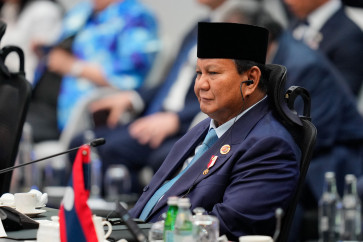Popular Reads
Top Results
Can't find what you're looking for?
View all search resultsPopular Reads
Top Results
Can't find what you're looking for?
View all search resultsDesperately fighting corporate crimes
Indonesia has been regulating criminal liability for corporate entities since the implementation of Emergency Act No
Change text size
Gift Premium Articles
to Anyone
I
ndonesia has been regulating criminal liability for corporate entities since the implementation of Emergency Act No. 7/ 1955 on Economic Criminal Offenses, although the very first technical statutory provision in this legal area was only enacted at the end of last December by the Supreme Court.
So it is no wonder that during this time, innumerable criminal cases involving corporate entities have rarely seemed to penalize the corporation itself.
First of all, a big thanks to the Supreme Court for their remarkable initiative so that law enforcers will have a clearer understanding of how to investigate, prosecute and execute sentences imposed on companies that have committed crimes.
However, a clearer understanding doesn’t mean this is good enough, rather, it is only just better than nothing.
My colleague Ricky Pratomo has comprehensively and rigorously explained (The Jakarta Post March 6, 2017) that determining the nationality of a corporation is not as easy as flipping a coin, yet it’s not the only issue regarding Supreme Court regulation No. 13/2016 (SC Regulation).
The very first thing that we have to pay close attention to is the layering system of contemporary enterprises. As Ricky explained, in this modern age corporate entities can easily create layers of legal persona to avoid any legal liability.
Using such a point of view, we might easily relate to article 6 of the SC regulation.
Article 6 regulates that a holding company shall be liable for crimes committed by its subsidiaries or other corporations that have a legal relationship with it, depending on the culpability of each company. Subsequently, to elucidate the culpability of the company we must relate to article 4 of the regulation.
Article 4 itself regulates that judges have to measure the culpability of the corporation based on (a) whether the corporation received any benefit or advantage from the crime or if the crime was committed for the sake of the corporation, (b) the corporation allowed the criminal offence to occur, (c) the corporation didn’t take any necessary steps to prevent the crime or the impact of the crime and didn’t ensure the compliance of the corporation with the law.
The provision seems to be so thorough, yet it is not sufficient. Not only is article 4 unclear about whether these elements must be cumulatively fulfilled or not, some particular cases can also make it worse. If A as a multinational company based in the United States in a good faith creates B as its subsidiary to do business in Indonesia, and B commits a crime in A’s nescience, yet A benefits from the crime conducted by B, is A liable?
If not, it will contradict article 4. If it’s liable it will make another problem; the execution of the sentence.
On the one hand, article 25 of the SC Regulation explains that the main punishment for corporate entities is only a fine. On the other hand, the execution of punishment in foreign countries must be based on a Mutual Legal Assistance Agreement. However, not every country in this universe is deign to do so.
Moreover, carrying out overseas punishment might become more complicated when dealing with corporations that have put their money in tax heaven countries. Remember the Panama papers case?
Even if the nationality of the convicted corporation is Indonesia and it does business only in Indonesia, if it put its money on tax heaven country, the court is still unable to know precisely the amount of wealth that company has, let alone how to execute the sentence.
Furthermore, the fining system has a problem when confronted with the amount of a corporation’s wealth. SC Regulation in article 28 regulates the mechanism under which if a corporation does not pay a fine, the prosecutor attorney may seize the property of the company and put it to auction.
Then, article 29 regulates the situation in which if that is still not enough, the board of the company will be detained.
Since it looks as if it could ensnare the boss of a corporation and not free the corporation of liability, such regulation might seem to be a good policy.
However, at the same time it encourages business entities to put as much of their money outside Indonesia as they can and invest as little in Indonesia as they need to. So that every time their company is in jeopardy, they can easily put the blame on the board while the money flies away with them.
All in all, it’s beyond difficult for me to say that the SC Regulation is sufficiently good for the business environment and not acknowledge the uncertainty of norms in this regulation.
Conversely, the provision must be refined immediately in order to strengthen the rule of law and avoid the avoidance of our entrepreneurs.
____________________________
The writer is a researcher at the Indonesia Judiciary Monitoring Society Faculty of Law, University of Indonesia, Depok, West Java.










